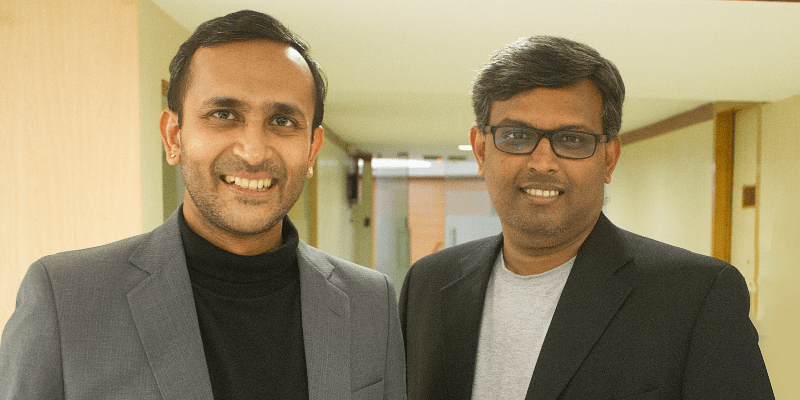Raghuram Ramamurthy, Baskar Agneewaran, and Ramesh Kumar saw a lot of potential in the AI market as it was an emerging and exciting area, with greater possibilities for new entrants.
Acquainted as colleagues, the trio had envisioned an intelligent platform that aimed to tackle the challenge of processing unstructured content. They felt this was a problem faced by 90 percent of enterprises, with the volume of unstructured content growing at 50-60 percent per year.
“We focused on automating highly-repetitive, data-intensive processes and other workflows for greater efficiency, scalability, and cost-effectiveness,” Raghuram tells YourStory. It led to the birth of Rapid Acceleration Partners (RAP) in Chennai in 2017.
enables hyper-automation for companies of all sizes through accessible and affordable solutions. It simplifies its functionality by allowing customers to use the platform’s ‘drag n drop’ feature to build their own use cases and implement them.
What does it do?
The platform-based solutions, RAPFlow and RAPBot, aim to solve the challenge of unstructured content. They streamline processes, boost operational efficiency, and provide significant ROI in a relatively short timeframe.
They are applicable across processes in IT, Finance, HR, and more. The solutions enable customer service automation via chat and email, document understanding, form recognition, and processing as well as intelligent automation of routine processes.
“We specialise in automating highly-repetitive, data-intensive processes across a range of industries including hospitality management, shared services, healthcare, BFSI, retail, logistics, real estate, and more,” says Raghuram.
However, working in the area of processing unstructured data and content data isn’t new to the trio. Raghuram and Baskar had been longtime friends since they were classmates in school. Later, they started working together on Vajro, a mobile app platform.
Meanwhile, Baskar happened to meet Ramesh at a resort in Kerala and became friends. Ramesh’s Silicon Valley experience of being a part of a founding team in another AI startup made him a good match for this venture.
“We spent a good six months talking to customers, understanding their challenges and issues. This was the genesis of the concept of the RAPFlow platform. It aimed to tackle the problem of automating the processing of unstructured content that is ubiquitous across industries,” says Raghuram.
The workings
In addition, the team also tackled the challenges of streamlining processes and boosting operational efficiency. Through RAPBot, they tackled different aspects of automation pertaining to unstructured content. This led to the next stage of Intelligent Process Automation (IPA) that uses both RAPFlow and RAPBot, enabling end-to-end automation or hyper-automation of processes.
RAPFlow and RAPBot are the offerings. Together they provide Intelligent Process Automation (IPA) capabilities for end-to-end process automation, which is also known as hyper-automation.
RAPFlow platform’s AI component enables automation of high volumes of unstructured content and provides full lifecycle AI orchestration on a single platform.
On the other hand, the RAPBot RPA (Rapid Process Automation) tool helps feed this output downstream and also automates rule-based processes.
The two founders of RAP
The challenges
Raghuram explains that one of their challenges has been in getting clients who understand the scope of AI – those who can grasp a clear understanding beyond the hype.
“We needed to find clients who were open to experimenting with this technology as we were in a nascent stage. We went out and actively prospected and made very purposeful outreach efforts, and that gave us customers who were open and ready – so we could accelerate our pilot projects. With our first few customers, we launched pilots to show success and value. Based on these, we expanded to broader implementations with our initial customers,” he says.
In the early days, they also faced challenges in getting strong AI developers. While the industry seems flooded with AI developers, the team found that it was rare to find the practical skillsets, talent and drive to do research, and produce proprietary algorithms. Today, RAP is a 35-member strong team.
The market and model
The platform provides a subscription-based model with intelligent automation-as-a-service to the clients. At scale, the founders say the margins in the business can be as attractive as 50-60 percent, not considering partner benefits. They charge anywhere between $1,000 to $10,000 to their clients. Some of RAP’s clients include – CAMS, KFintech, SalesCatcher, SBI Group, and Global Engine Maintenance.
According to a Bain & Company report in December 2020, Indian companies will double their share of the global SaaS market to seven to nine percent over the next two years, on the back of key strategic initiatives. The global market is expected to touch $230 billion in 2022 on a compound annual growth rate of 15 percent.
Some of the startups in the SaaS space include FreshWorks, ChargeBee, CleverTap, Zluri, and others.
“Our crucial differentiator is that we provide AI and RPA bundled into one native platform. We also provide the maximum value for money offering in the market. Moreover, we are very solution-focused, and our democratised solutions are quick to deploy and don’t require any specialist knowledge. This culmination of factors sets us apart in the industry,” claims Raghuram.
RAP had raised an undisclosed investment from undisclosed investors when they started out.
“In future, we plan to unify the platforms, enabling bot-as-a-service for truly democratised IPA offerings for companies of all sizes,” says Raghuram.










